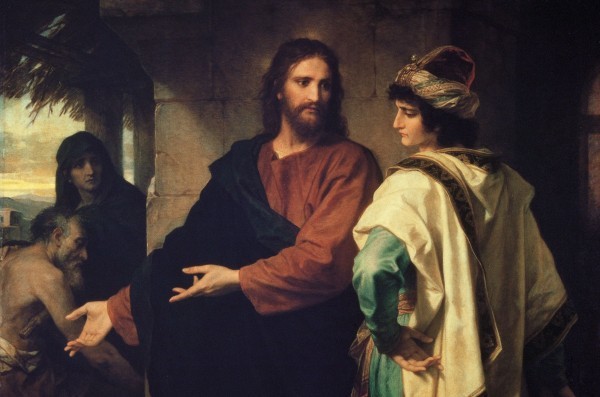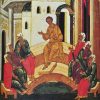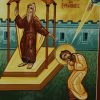“Now a certain ruler asked Him, saying, “Good Teacher, what shall I do to inherit eternal life?” So Jesus said to him, “Why do you call Me good? No one is good but One, that is, God. You know the commandments: ‘Do not commit adultery,’ ‘Do not murder,’ ‘Do not steal,’ ‘Do not bear false witness,’ ‘Honor your father and your mother.’ And he said, “All these things I have kept from my youth.” So when Jesus heard these things, He said to him, “You still lack one thing. Sell all that you have and distribute to the poor, and you will have treasure in heaven; and come, follow Me.” But when he heard this, he became very sorrowful, for he was very rich. And when Jesus saw that he became very sorrowful, He said, “How hard it is for those who have riches to enter the kingdom of God! For it is easier for a camel to go through the eye of a needle than for a rich man to enter the kingdom of God. And those who heard it said, “Who then can be saved?” But He said, “The things which are impossible with men are possible with God.”
If we put this Gospel Lesson in a modern Orthodox context, it is possible to imagine the average Orthodox parishioner coming to confession and telling the priest, “I don’t really know what to confess for I haven’t murdered anyone, I haven’t committed adultery, I haven’t stolen anything or told any big lies.”
To that the priest can reply like Christ: “Good for you, then all you need to do is sell all you have and give it to the poor and go and follow Christ!”
How many of us would walk away from such a confession every bit as sorrowful as that certain ruler of the Gospel lesson?
For we might think highly of ourselves that we haven’t committed any major sins, and yet we pray constantly in the Church that we might spend the remaining time of our life in repentance.
If however we are so unaware of what sins we might be committing, then we do need to do what Christ offered to that certain ruler: sell all we have and distribute it to the poor and then follow Him. Only once we have freed ourselves from our riches will we be able to follow Him.
Such in the challenge of today’s Gospel. Maybe it really is “easier” for us to examine our consciences a bit more and to repent of our sins (to give our sinful ways away!) than it is for us to give up our wealth (however meager it may be). It is easier for a camel to go through an eye of a needle than for the rich to enter into heaven.
In any before we go into confession and say we have nothing much to confess, we might want to examine our consciences, or be prepared to be told to sell all we have and then follow Christ.
As a second point, consider Jesus’ words that where your treasurer is there your heart will be as well. Our treasures are not always our “material wealth” or “prosperity.” Sometimes the things we treasure in our hearts are our anger against someone, the unwillingness to forgive, our sexual lust, our greed, our self willfulness. We treasure our time in front of our TVs and computers, pornography, alcohol, drugs, sex. All of these things are our “riches” because we are determined to hold onto them and never give them up.
We can try to get around Jesus’ words by being exactly literal – I too have not committed adultery or stolen or committed murder. But like the rich ruler, I may have stored up these other treasures in my heart. And indeed holding a grudge and keeping your hatred is making that a treasure. So sometimes the things we value and refuse to give up are obviously spiritually harmful too, yet we cling to them, our anger and lust, every bit as much as the ruler clung to his gold – to his detriment and to our own.
St. Paul offers us the more perfect way:
The saying is sure and worthy of full acceptance, that Christ Jesus came into the world to save sinners‑‑of whom I am the foremost. But for that very reason I received mercy, so that in me, as the foremost, Jesus Christ might display the utmost patience, making me an example to those who would come to believe in him for eternal life. To the King of the ages, immortal, invisible, the only God, be honor and glory for ever and ever. Amen. (1 Tim. 1:15-17)
St. Paul accepted a life time of repentance and was not ashamed to admit that he was the foremost of sinners because he also recognized this confession did not put him in God’s disfavor but rather in God’s grace. He acknowledged his previous way of life was wrong and turned to God to change his personal sinful ways and to embrace the Way of God.

















